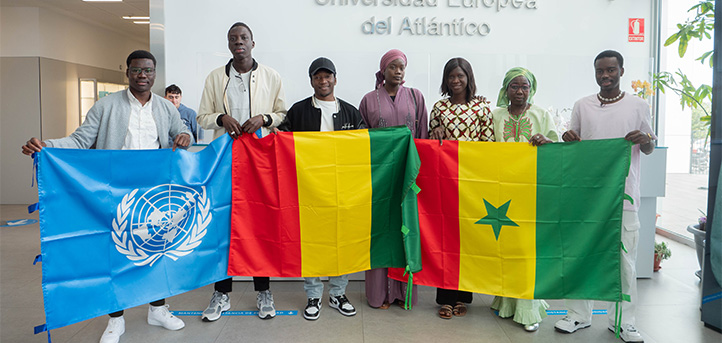On May 25, the European University of the Atlantic (UNEATLANTICO) celebrates Africa Day, which is a special occasion to reflect on the achievements and challenges of the African continent.
For UNEATLANTICO, the presence of students from various African countries is important, increasing the global vision of the campus. Among the university community, we are proud to have students from Angola, Cape Verde, Cameroon, Ivory Coast, Equatorial Guinea, Mali and Senegal. In addition, it is worth mentioning the partnership with the Universidade Internacional do Cuanza (UNIC).
It is important to highlight the African Union (AU) Agenda 2063, a strategic roadmap created to boost Africa’s socioeconomic development and integration over a 50-year period, starting from 2013 and culminating in 2063. Its vision is based on a prosperous, integrated and peaceful Africa, led and managed by its own citizens, and representing a dynamic force on the international stage.
Education: The pillar of Africa’s future.
Education is indisputably one of the central pillars of Agenda 2063. The objective is to ensure that young Africans acquire relevant skills and knowledge to face the challenges of the 21st century and contribute to the development of their communities and nations.
UNEATLANTICO, together with the Ibero-American University Foundation (FUNIBER), seeks to contribute to this goal through scholarships offered to students, international networks for the promotion of education in different countries, and the training of teachers in the continent.
Training: Preparing youth
Technical and professional training is another crucial component for the success of Agenda 2063. Providing practice spaces, professional networks and up-to-date learning is our commitment to the training of young Africans. Creating opportunities for sustainable growth.
The AU, for its part, recognizes that to achieve inclusive and sustainable economic growth, it is vital to create decent and productive employment. This involves not only generating employment in traditional sectors, but also promoting green jobs and jobs in emerging and high-tech sectors.
The creation of a favorable environment for investment, the empowerment of small and medium-sized enterprises (SMEs) and the integration of digital economies are some of the strategies promoted to foster employment.
This vision is articulated around the concept of “The Africa We Want” a framework that brings together diverse voices from all corners of the continent, indicating how they would like to see their pan-African home in the future. Among the main aspirations of this vision are improved education, training and employment as key elements for sustainable development and the empowerment of African youth.
The Africa we want
“The Africa we want” is an aspiration shared by millions of Africans, envisioning a united, prosperous and peaceful continent. This modern pan-Africanism is built on respect for cultural diversity, social inclusion and intergovernmental cooperation. From the academic network in which FUNIBER participates, voices were gathered from different countries indicating how they want the Africa of the coming years. African students, professors and collaborators manifest this shared video.
By celebrating Africa Day, from the area of Social Action of FUNIBER, we remember and support the efforts for sustainable development so that all Africans have the opportunity to reach their full potential, thus contributing to “The Africa we want”.


